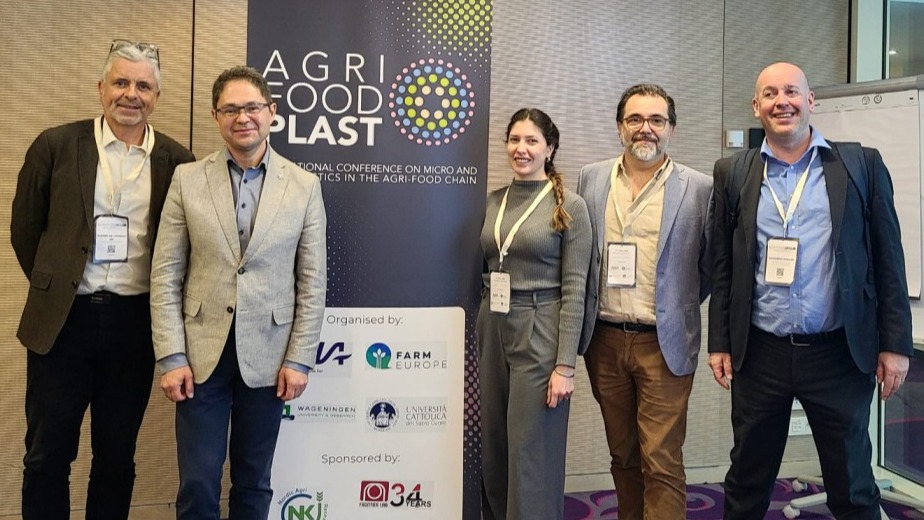Advancing sustainable solutions to agricultural plastics: FAO headlines AGRIFOODPLAST 2025

From left to right: Pierre de Lépinau, indipendent consultant, Lev Neretin and Giulia Carcasci, FAO, Luca Nizzetto, NIVA, and Edoardo Puglisi, Università Cattolica del Sacro Cuore.
Brussels, Belgium - There is an urgent need for collaborative action to address plastic pollution in agriculture. This call came during AGRIFOODPLAST 2025, the international conference on micro and nano-plastics in the agrifood chain, which presented mounting evidence of their detrimental impacts across the ‘One Health’ spectrum, on ecosystems, animals and people alike.
Experts from the Office of Climate Change, Biodiversity and Environment (OCB) at the Food and Agriculture Organization of the United Nations (FAO) played a significant role in the conference, which discussed innovative solutions for sustainable plastic management in agrifood value chains.
FAO Environment Team Lead Dr Lev Neretin says a comprehensive approach is needed, which considers the interconnectedness of human, animal and environmental health: “Moving forward,” Dr Neretin said, “collaboration between governments, the private sector, research institutions, and other stakeholders will be essential for developing and implementing effective strategies to tackle plastics pollution in agriculture. FAO is committed to helping them find sustainable solutions to this complex issue.”
Concerning research
Over two days, presentations at AGRIFOODPLAST 2025 revealed that plastics in agriculture are degrading soil health and ecosystem functions, altering soil structure, reducing water retention, and inhibiting plant growth. Others showed that livestock exposed to these plastic fragments simultaneously experienced oxidative stress, inflammatory responses and endocrine disruption. Others discussed the potential for transfer of plastic particles into animal products consumed by humans, with alarming health implications for the population.
FAO personnel organized a roundtable titled “Which paths towards a sustainable use and management of agricultural plastics?”, which saw researchers and industry representatives explore policy options and best practices for reducing the risks associated with agricultural plastics, while maintaining their benefits. Discussions focused on advancing sustainable use and management strategies across the entire plastic lifecycle, including design, use, collection, and disposal.
FAO Environment Team Lead Dr Lev Neretin moderated a session “Plastics and plastic additives in food: a One Health perspective over plastic pollution," and FAO Agricultural Plastics and Sustainability Specialist Giulia Carcasci delivered a keynote presentation outlining FAO's ongoing efforts to support the development of regulatory frameworks promoting sustainable use and management of plastics in agriculture and reaffirming the organization’s pivotal role in fostering international collaboration and science-based solutions to tackle the issue.
Taking action
Through the urgent implementation of Provisional Voluntary Code of Conduct on the Sustainable Use and Management of Plastics in Agriculture (VCoC) and engagement in international negotiations on a global plastic treaty, FAO is working to ensure that the benefits of agricultural plastics can be maintained while minimizing their environmental and health impacts.
By promoting sustainable management and investing in innovative solutions, the agrifood sector can play a key role in addressing the global challenge of plastic pollution.
To learn more about FAO’s work on management of plastics in agriculture, follow the link: https://www.fao.org/climate-change/areas-of-work/plastics-in-agriculture/
